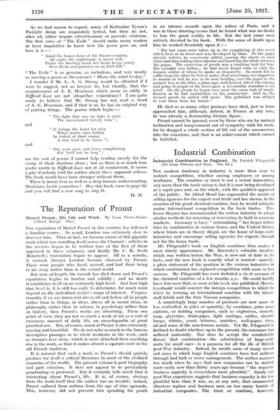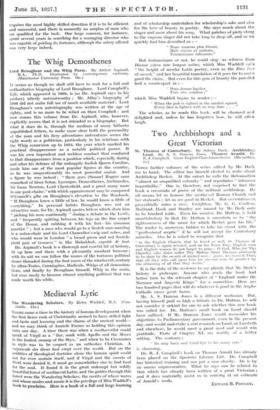Industrial Combination
- -- Industrial Combination in England. By Patrick Fitzgerald. (Sir Isaac Pitman and Sons. 10s. 6d.) •
THE modern tendency in industry is more than ever to restrict competition, whether among employers or among
workmen. The combine or trust is not a recent innovation, any more than the trade union is, but it is now being developed at a rapid pace and, on the whole, with the qualified approval of the public. Sir Alfred Mond has expounded the merits of selling agencies for the export coal trade and has shown, in the creation of the great chemical combine, how he would mitigate undue international competition in the basic trades. Pro- fessor Keynes has recommended the cotton industry to adopt similar methods for retaining or recovering its hold in overseas markets. Germany is busy " rationalizing " her larger indus- tries by combination in various forms, and the United States, where trusts are in theory illegal, arc the home of large-scale industries and encourage selling agencies for exports though not for the home trade.
Mr. Fitzgerald's book on English combines thus makes a most timely appearance. Mr. Macrosty's valuable treatise, which was written before the War, is now out of date in its facts, and the new book is exactly what is wanted—namely, a plain statement of the position in the various industries in which combination has replaced competition with more or less success. Mr. Fitzgerald has even included a sin rt account of the chemical combine of a few months tro. He could hardly have fore-seen that, as soon as his book was published, Messrs. Courtauld would counter the foreign competition to which he refers by forming an international combine with the Glanz- stoff-fabrik and the Snia Viscosa companies.
A surprisingly large number of products are now more or less controlled, in price or quantity, by combines, price asso- ciations, or holding companies, such as explosives, cement, soap, glycerine, drain-pipes, light castings, cables, electric lamps, whisky, yeast, -tobacco, matches, wall-paper, tires, oil and some of the non-ferrous metals. Yet Mr. Fitzgerald is clined to doubt whether, up to the_present, the consumer has suffered materially. Nor does he accept the comfortable theory that combination—the substitution of large-scale units for small ones—is a panacea for all the ills of British post-War industry. Indeed, he recalls some of many recent sad cases in which large English combines have lost millions through bad luck or worse management. The author assumes too much when he says that new companies can be started more easily now than thirty years ago because" the requisite business capacity is everywhere more plentiful." Surely our post-War experience suggests that business capacity is far less plentiful here than it was, or, at any rate, that ornamental directors replace real business men on too many boards of industrial companies. The trust or combine, however,
requires the most highly skilled direction if it is to be efficient and successful; and there -ii assuredly no surplus of men who are -qualified for the task. One large concern, - for instance, spent- several years in searehing for a managing director who was capable of guiding its fortunes, although the salary offered was very large indeed.















































 Previous page
Previous page